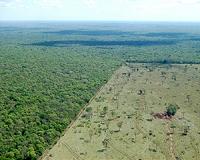| . |  |
. |
Washington DC (SPX) Dec 09, 2010 Foreign pests are eating their way through our national forests, destroying majestic scenery and costing taxpayers millions of dollars. If enforcement efforts to prevent their importation aren't stepped up, irreplaceable resources will be lost forever and taxpayers can expect to fork over billions of dollars by 2019, according to a comprehensive study published in BioScience. Researchers at the University of California at Santa Barbara, Michigan State University, the University of Central Florida and the United States Department of Agriculture Forest Service analyzed the impact of invasive insects and pathogens introduced into the United States through 2007. What they found was a staggering list of more than 455 insects and 16 pathogens that are destroying everything from oak trees in California to redbay trees in Central Florida. Based on the pattern, the researchers predict one especially destructive pest will sneak into the nation every two years. "Entire forests are being wiped out, and it is costing taxpayers millions as the government tries to eradicate invaders that threaten industries dependent on trees and plants," said Besty Von Holle, a UCF biologist who worked on the project. "We're losing a variety of native species as a result of importing these pests. It's not just aesthetics. It's impacting our economy." These pests and diseases sneak into the country on everything from horticultural (or plant) imports to the wooden pallets used to transport building supplies, electronic goods and toilet paper, among other products. "Global trade has had tremendous benefits for Americans," said lead author Juliann Aukema from the National Center for Ecological Analysis and Synthesis in Santa Barbara. "Unfortunately, it also has resulted in the introduction of destructive insects and other organisms that threaten native ecosystems and the services they provide." No section of the country is immune. Laurel wilt disease is one of the latest organisms to be spread by a foreign beetle in the southeastern United States. It is wiping out redbay trees in Georgia and last month was discovered in Seminole County, Fla. Redbay trees are important to wildlife, and certain butterflies depend on them for survival. California has been battling sudden oak death, a pathogen that is destroying oak trees in California and Oregon since the 1990s. California has spent millions trying to stop it, because the trees are a state treasure. The Asian longhorned beetle, which came into the United States hidden in wooden packing pallets, has ravaged all sorts of trees in New York City and Chicago. So far, those communities have spent $220 million fighting the infestation. Another beetle, the emerald ash borer, has been destroying trees in the Midwest since 2002. It is estimated municipalities will spend more than $10 billion for landscape and tree treatments and removals in the next 10 years battling the ash borer. "Once here, these invasive species are virtually impossible to stop," Von Holle said. Recommendations include better screening before letting items into the country. The department within the USDA that is in charge of screening at airports and ports is now part of Homeland Security. "These screening agents have too much to do, and right now the focus is on finding bombs and weapons," Von Holle said. "That's absolutely right, but we also need to be more aggressive about biological threats that could undermine large parts of the U.S. economy and harm our environment."
Share This Article With Planet Earth
Related Links University of Central Florida Forestry News - Global and Local News, Science and Application
 Climate talks eye deforestation pact
Climate talks eye deforestation pactCancun, Mexico (AFP) Dec 6, 2010 A global climate treaty looks far off, but negotiators say talks in Mexico may reach one key agreement - on how to fight deforestation, a top cause of carbon emissions. A pact on reducing emissions from deforestation in developing countries - known to negotiators as REDD - would consist largely of offering financial incentives to developing countries such as Brazil, Indonesia and the Demo ... read more |
|
| The content herein, unless otherwise known to be public domain, are Copyright 1995-2010 - SpaceDaily. AFP and UPI Wire Stories are copyright Agence France-Presse and United Press International. ESA Portal Reports are copyright European Space Agency. All NASA sourced material is public domain. Additional copyrights may apply in whole or part to other bona fide parties. Advertising does not imply endorsement,agreement or approval of any opinions, statements or information provided by SpaceDaily on any Web page published or hosted by SpaceDaily. Privacy Statement |